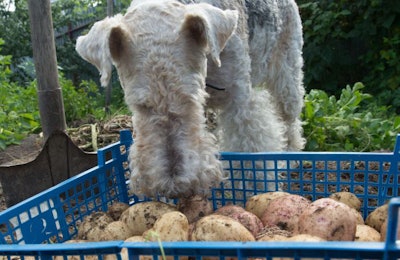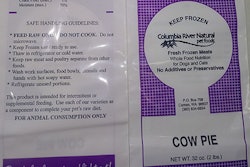
On opposite sides of the planet, scientists and veterinarians observed associations among cases of two rare diseases and dog food in 2018. In Australia, more than 100 dogs developed megaesophagus after eating Mars Petcare Australia Advance Dermocare dry dog food. In the United States, the U.S. Food and Drug Administration issued a warning about correlations between canine dilated cardiomyopathy and dog foods with high contents of legumes or potatoes, especially those marketed as grain-free.
Megaesophagus cases associated with Australian dog food
In December 2017 in Victoria, Australia nine police dogs, including one who was euthanized, were affected by megaoesophagus, an enlargement of the esophagus. One common factor among the dogs was consumption of Advance Dermocare dry dog food. As of June 6, the number of cases had climbed higher than 100.
Megaesophagus is characterized by generalized enlargement of the muscular tube leading from the throat to the stomach, the esophagus. The enlargement is associated with decreased or lack of movement by the esophagus, which reduces the animals ability to move food and liquids into the stomach.
Research associated megaesophagus with particular dog food
Earlier this month, University of Melbourne U-Vet Hospital researchers released the results of an epidemiological analysis of the connection between Advance Dermocare and megaesophagus in dogs.
The study revealed a significant statistical association between the use of Advance Dermocare and diagnosis of megaesophagus in dogs. The findings also showed a subsequent decrease in the number of megaesophagus cases following voluntary withdrawal of the product from the market.
When researchers looked at a sub-set of dogs with megaesophagus, the odds of them having being fed Mars Petcare Advance Dermocare in the six months prior to diagnosis was 437 times greater for cases, compared with controls, according to U-Vet Hospital Director, Associate Professor Caroline Mansfield, Ph.D., who led the study.
“This is an extremely strong association, there is about a one in a million probability that this occurred by chance, supporting the hypothesis that Advance Dermocare was associated with this outbreak of idiopathic megaesophagus in dogs,” Mansfield said in a press release. “Not all dogs fed Advance Dermocare developed megaoesophagus, but for dogs in the same household as another affected dog, had a higher chance of developing megaoesophagus themselves than the rest of the dog population...
“We suggest that the primary cause of this outbreak of megaesophagus is likely to be multifactorial. As not all dogs fed this diet were affected, there may be some individual factors such as breed, predisposition to food intolerance or household factors contributing,” Mansfield said.
Following the megaesophagus outbreak, the Australian Senate opened an inquiry into the country’s pet food regulations. The inquiry committee released their recommendations on October 16 in the report, “Regulatory approaches to ensure the safety of pet food.”
Australian lawmakers reacted to megaesophagus cases
Currently, Australia’s pet food industry has no legally mandated recall system overseen by a government agency. Likewise, pet owners have no means by which to report issues with their animals’ food to the government.
The Senate inquiry committee made several recommendation in the report, including:
- Free, uninhibited access to the regulations regarding pet food, the Australian Standard for the Manufacturing and Marketing of Pet Food (AS5812:2017), which currently costs approximately AUS128.19
- Improvement of those regulations to include specific requirements for feeding trials and other testing prior to pet food sale, as well as mandatory labelling standards that detail all ingredients including preservatives, additives, and which disclose heat, irradiation or other treatments to the product
- Developing a national pet food manufacturing and safety policy framework, and review a process by which to make these policies mandatory
- Improve data collection by the Australian Veterinary Association and Australian Competition and Consumer Commission (ACCC) using the PetFAST system.
- Establish a system for consumer reporting on the ACCC Product Safety Australia website, to enable people to lodge complaints and concerns associated with pet food.
- Establish a mechanism to investigate adverse pet food events and develop a complementary education campaign to raise awareness of the adverse pet food reporting, investigation and recall regime.
Dilated cardiomyopathy correlation of dog foods in the United States
While Australian scientists were dealing with the megaesophagus problem in July, the U. S. Food and Drug Administration alerted pet owners and veterinary professionals about reports of canine dilated cardiomyopathy (DCM) in dogs eating certain pet foods containing peas, lentils, other legume seeds, or potatoes as main ingredients. High levels of legumes or potatoes appear to be more common in diets labeled as “grain-free,” but it is not yet known how these ingredients are linked to cases of DCM.
These reports are unusual because DCM is occurring in breeds not typically genetically prone to the disease. The FDA’s Center for Veterinary Medicine and the Veterinary Laboratory Investigation and Response Network, a collaboration of government and veterinary diagnostic laboratories, are investigating this potential association.
Diets in cases reported to the FDA frequently list potatoes or multiple legumes such as peas, lentils, other “pulses” (seeds of legumes), and their protein, starch and fiber derivatives early in the ingredient list, indicating that they are main ingredients. Early reports from the veterinary cardiology community indicate that the dogs consistently ate these foods as their primary source of nutrition for months to years.
In the reports the FDA has received, some of the dogs showed signs of heart disease, including decreased energy, cough, difficulty breathing and episodes of collapse. Medical records for four atypical DCM cases, three Golden Retrievers and one Labrador Retriever, show that these dogs had low whole blood levels of the amino acid taurine. Taurine deficiency is well-documented as potentially leading to DCM.
Not all legumes implicated in FDA dog heart disease study
However, FDA’s investigation is just beginning and not all legume seeds, a group including beans, are implicated, especially since many aren’t used in high quantities, said an agency representative.
Legumes, classed in the family Fabaceae, and their seeds include various products used in pet and human food. For example, kidney, navy, pinto and green beans are all varieties of the legume Phaseolus vulgaris. Soy beans (Glycine max) too are legumes. Beyond whole beans, other products used in pet food are made from beans, such as guar gum, a thickening agent used mostly in wet pet foods, which is made from the legume Cyamopsis tetragonoloba.
The FDA is still investigating individual ingredients under the legume, pulse or potato “umbrella,” said Anne Norris, FDA Center for Veterinary Medicine health communications specialist.
“So, I would suggest not taking intuitive leaps beyond what is explicitly stated in our public notice right now,” she said.
For example, guar gum is generally recognized as safe (GRAS) for use as a stabilizer (21 CFR 582.7339), she said. Stabilizers like guar gum are not ordinarily included in pet food in such a large concentration that they would be listed toward the top of the ingredient list (as a main ingredient). Likewise, many othey legumes aren’t implicated in FDA’s investigation, since they appear in small amounts or are uncommon in dog food.
The FDA investigation remains in its initial stages, as the agency examines the possible connection between canine dilated cardiomyopathy (DCM) and high levels of certain dog food ingredients.
“It is still early in the investigation and right now we’re simply notifying the public, practitioners, and manufacturers that we are observing a signal that warrants further study,” said Norris. “The common thread seems to be legumes and/or potatoes as main ingredients in the food. Currently, it’s a correlative link, not a causative one. We’re hoping that after receiving data from pet owners and veterinarians, we will have more data to further inform our investigation.”
As the investigation continues, FDA hopes that the public and veterinarians will collaborate with the agency to bring more cases to their attention.
Stopping grain-free diet, adding taurine helped dogs’ DCM
While Golden Retrievers may have a genetic predisposition to dilated cardiomyopathy (DCM), scientists documented that specific diets were associated with the development of taurine deficiency, which correlates with increased the risk of dilated cardiomyopathy. Specifically, in a study, 23 out of 24 Golden Retrievers diagnosed with taurine deficiency and dilated cardiomyopathy ate grain-free and/or legume-rich dog food diets. The majority of those dogs’ health improved after diet change and taurine supplementation.
The scientists published the results of their research, “Taurine deficiency and dilated cardiomyopathy in golden retrievers fed commercial diets,” in the journal PLOS ONE.
“Taurine deficiency and dilated cardiomyopathy in golden retrievers is likely multifactorial, including a combination of dietary, metabolic, and genetic factors,” the researchers, led by a team from the School of Veterinary Medicine University of California - Davis, wrote in their conclusions. Numerous veterinarians from across the United States also contributed.
Investigations into canine dilated cardiomyopathy and megaesophagus will continue in 2019 as scientists, veterinarians and pet food industry professionals search for answers.














